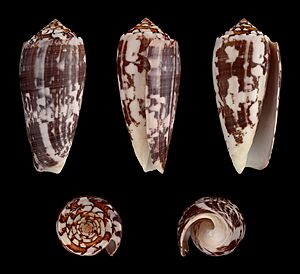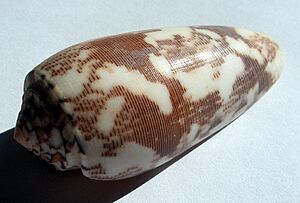Conus striatus facts for kids
Quick facts for kids Conus striatus |
|
|---|---|
 |
|
| A shell of Conus striatus | |
| Conservation status | |
| Scientific classification | |
| Synonyms | |
|
The Conus striatus, also known as the striated cone, is a fascinating type of sea snail. It's a marine gastropod mollusk, which means it's a soft-bodied animal, often with a shell, that lives in the ocean. This snail belongs to the Conidae family, commonly called cone snails.
These snails are predatory, meaning they hunt other animals for food. They are also venomous, which means they can inject a powerful toxin. Conus striatus mainly eats fish. Because their "sting" can affect humans, it's very important to be careful around them. It's best not to touch live cone snails at all.
There are a few different types, or subspecies, of Conus striatus. These include Conus striatus juliaallaryae, Conus striatus oahuensis, and Conus striatus striatus. Each one has slight differences, but they are all part of the same species.
What Does the Striated Cone Snail Look Like?
The shell of the Conus striatus is quite large and slender. It can range in length from about 44 millimeters (1.7 inches) to 129 millimeters (5 inches). The shell has a unique pattern, often looking like a mix of pink-white and brown or chocolate colors. It has many fine lines that go around the shell, creating its darker background color.
The top part of the shell, called the spire, is pointed. It has a checkerboard pattern of brown or chocolate and white. The "shoulders" of the shell are rounded, and the lines where the shell grows, called whorls, are slightly grooved. The opening of the shell, known as the outer lip, has a noticeable flare at the back.
Where Do Striated Cone Snails Live?
You can find Conus striatus in various parts of the world's oceans. They live in the Red Sea and across the Indian Ocean. This includes places like the Aldabra Atoll, Madagascar, the Mascarene Basin, Mauritius, and Tanzania.
They are also found in the Pacific Ocean. Their habitats there include the Philippines, parts of Australia (like the Northern Territory, Queensland, and Western Australia), New Zealand, New Caledonia, and Thailand. You can also spot them around the Hawaiian islands.
Gallery







